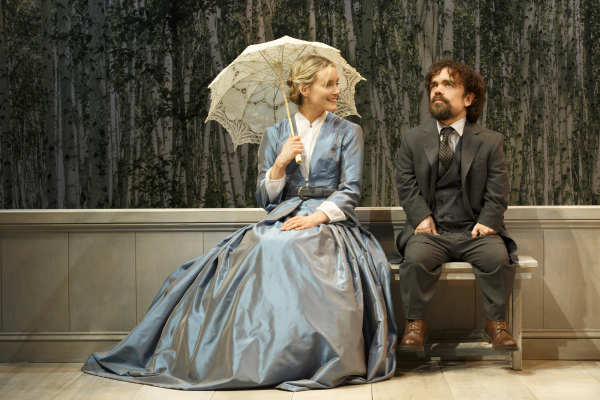A Month in the Country
Taylor Schilling and Peter Dinklage star in a surprisingly fresh revival of Ivan Turgenev’s classic comedy.

(© Joan Marcus)
The most painful phrase uttered in Ivan Turgenev's A Month in the Country is, "We part as friends." Even in 1840s Russia, Siberia seemed a more pleasant place for banishment than the friend zone. Yet that's just where so many of these unhappy Russians end up. Starring Taylor Schilling (Orange Is the New Black) and Peter Dinklage (Game of Thrones), Turgenev's 19th-century rom-com is now receiving a thrilling revival at Classic Stage Company. With an efficient translation by John Christopher Jones and powerfully understated direction by Erica Schmidt (who is married to Dinklage), this 165-year-old play feels incredibly modern, even edgy, in its treatment of complicated adult relationships.
Natalya (Schilling) is the mistress of a large Russian country estate owned by her husband, Arkady (Anthony Edwards as a cheerful cuckold/workaholic). While he's busy all day overseeing his serfs, Natalya hangs out with her best friend, Rakitin (Dinklage). Rakitin is in love with Natalya, but she has her sights set on Aleksey (the inscrutable and alluring Mike Faist), the handsome young tutor to her son, Kolya (Ian Etheridge). Pushing 30, Natalya worries that Aleksey is more interested in their ward, the 17-year-old Vera (Megan West). Incidentally, Bolshintsov (Peter Appel), a socially awkward local landowner with 320 serfs, is also interested in Vera. Like the wicked queen in Snow White, Natalya schemes to push the younger woman to the side and claim her hot young prize. She's the fairest one of all: deserving of a rich husband, a 21-year-old piece on the side, and a lovelorn admirer. She has everything, but why does she still seem so very sad?
Schilling excels at playing the bully older sister, taking what she will and looking benevolent while doing it. "Now, we're such good friends, we should tell each other everything," she mischievously says to Vera during a session of girl talk. This, after she's just obviously lied to Vera, telling her she married for love (and not for Arkady's fat wallet). Shilling adds an extra layer to her mean-girl routine, expressing a genuine disgust with her desires and actions. "I’m despicable," she tells Rakitin during a private moment, understanding the implications of her jealousy of Vera.
"You're in love," he responds frankly. And certainly, he would know: He harbors feelings for the wife of his good friend. He's in no position to judge. The pain of Rakitin's unrequited love is a constant presence when Dinklage takes the stage. With a knowing yet resigned smile, Dinklage's Rakitin is smart enough to understand the situation, but not nearly powerful or cruel enough to do anything about it.
Meanwhile, aging country doctor Shpigelsky (Thomas Jay Ryan) attempts to woo Lizaveta (Annabella Sciorra), a spinster friend of the family, with a very practical and completely unromantic appeal. The young servant Katya (the very funny Elizabeth Ramos) has attracted the attention of two older men: German tutor Schaaf (Frank Van Putten) and the servant Matvei (James Joseph O'Neil). Ramos and O'Neil give us a touching and specific look into this b-plot romance, which plays out mostly while they are moving the furniture between scenes.
Mark Wendland's flexible set provides space for the various indoor and outdoor scenes. It also gives director Schmidt the latitude for some truly inventive blocking (the couches of confrontation in the fifth act are a particularly nice touch). Tom Broecker's period costumes give us a firm sense of time and place while hammering home Natalya's Disney-princess-turned-villainess vibe. Schmidt and translator Jones dig deep into Turgenev's story of sensible marriages and forbidden desires, all while bringing the production in under two hours and 10 minutes.
A Month in the Country feels quite timely as we enter an age increasingly skeptical of love at first sight and happily ever after (note the difference between the endings of Sleeping Beauty and Frozen). Turgenev's portrait of practical and flawed relationships is like a breath of fresh air after so many decades of idealized irrational love.









